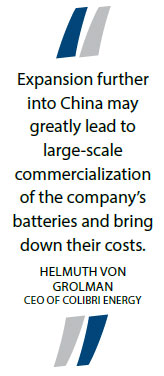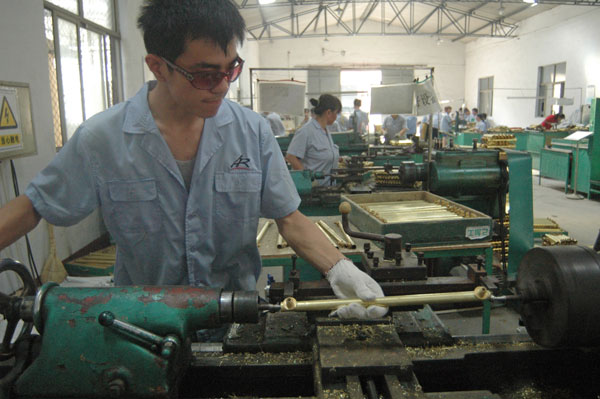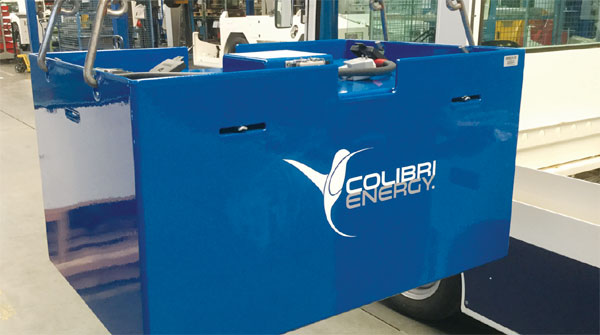China a magnet for firms to commercialize new tech
Updated: 2015-08-07 09:28
By Cecily Liu(China Daily Europe)
|
|||||||||||
Market used as testing ground for development
China's industrial capability and large consumer market make it an ideal location to commercialize new environmentally friendly technologies and improve on existing high-technology solutions, Western company executives say.
Often newly discovered and developed technologies are costly to consumers, but commercializing them in China will cut costs and at the same time give access to China's large domestic market, allowing companies to benefit from economies of scale and permit niche sector technologies to become more commonplace.
|
Colibri batteries that are environmentally friendly and cheaper to use than tranditional lead-acid batteries. Photos provided to China Daily |
|
Helmuth von Grolman, CEO of Colibri Energy. |
The highly sophisticated e-bikes developed by the British architectural company ZEDfactory Ltd, called the ZEDbike, is an ideal example. Currently, European-made electric bikes can cost about 2,000 euros ($2,190), but a planned partnership between ZEDfactory and China's Luyuan Electric Vehicle Co Ltd will bring the price down to 1,000 euros.
Powered by solar energy, the e-bike travels at much faster speeds compared with conventional bikes, which means it has the potential to replace cars for urban travel, and hence reduce emissions, says Bill Dunster, founder and principal of ZEDfactory.
Dunster says he is in advanced discussions with the Chinese electric scooter manufacturer Luyuan Electric Vehicle to manufacture the ZEDbike in China, which will significantly reduce unit cost and increase the company's accessibility to consumers.
"The cost reduction can be achieved because the Chinese government has invested heavily into many technologies that we need for the ZEDbikes, including lithium batteries and motor manufacturing. The availability of these technology and manufacturing facilities in China creates an opportunity for us to commercialize the ZEDbikes in China," Dunster says.
If the negotiations are successful, ZEDbikes will be sold both in China and globally. "China will be a key market for these bikes because in China private vehicles will encounter a lot of congestion, and commuting through cycling will create convenience for customers," he says.

A crucial difference between the ZEDbikes and other electric bikes in Europe is their ability to have batteries replaced. Dunster says he hopes to create partnerships with cycle hire programs run by Chinese companies so that the batteries can be replaced at docking stations and consumers do not need to worry about charging the batteries themselves.
He says each battery of the ZEDbike would allow about 40 kilometers of travel at the speed of 30 kilometers per hour. If the speed is slower, the overall distance cycled is greater.
Dunster came up with the idea of ZEDbike seven years ago, and he has since made a small number of these bikes for testing purposes. These bikes have had components made in China but are assembled in the UK.
Another example is the German company Colibri Energy GmbH, which has developed power-storage technology that can store renewable energy to efficiently recharge industrial production machinery.
As a new company founded in 2011, Colibri has exploited a market mainly in Germany, the US and Middle East, but expansion further into China may greatly lead to large-scale commercialization of the company's batteries and bring down their costs, says CEO Helmuth von Grolman.
Compared with lead-acid batteries, the more environmentally friendly battery Colibri produces is about twice or three times as expensive at the time of purchase, but because of higher capacity, fast-charging ability, maintenance-free operation, and tolerance to harsh environmental conditions, the total cost of using Colibri's batteries over their lifetime would be 50 percent less than the equivalent lead-acid batteries.
Nevertheless, increasing the scale of production would help to make the batteries more accessible to a larger user base, Von Grolman says.
Currently the amount of automation in the production process of the batteries is limited, but this could change with an increase in volume and scale. In addition, the company may consider production in different markets, such as China, if local demand is sufficient to justify the expansion.
"We could consider production in a market with large volumes, because it doesn't make sense to gather all the components from different countries in the world and make them only in Germany before dispatching to the customers' countries," he says.
British company Green Biologics, which has developed innovative bio-based normal butanol (or biobutanol) production technology, says that working with Chinese biobutanol plants has helped to validate its technology.
Biobutanol, which turns agricultural waste products into high-value chemicals and biofuels, is a substitute for petroleum-based n-butanol and an important chemical used in the production of paint, adhesives, inks and plastics.
Tim Staub, global vice president of business development at Green Biologics, says the company's technology is now used in pilot and demonstration plants in the US, and it is in active discussions with potential production partners in Europe, Canada and Southeast Asia, but that working with Chinese partners to demonstrate the technology's commercial viability was helpful as a first-stage development.
Between 2003-2006, China built a number of large biobutanol plants using corn as a feedstock, but later the price of corn rose dramatically, rendering the plants uneconomical. Staub says at the time Green Biologics saw an opportunity to demonstrate its technology through China's agricultural feedstock and show at commercial scale the viability of its technology.
In 2011, Green Biologics started to work with Lignicell Refining Biotechnology in Songyuan, Jilin province, to demonstrate the companies' joint ability to produce cellulosic n-butanol and acetone on a large scale. "Like most collaborations, our partnership with Lignicell Refining Biotechnology was a combination of technology, capital and people talent," Staub says.
Meanwhile, many companies with well-established technology are also taking their products to China for further development to suit China's market demands, such as the German green building technology companies VEKA and Baumit.
VEKA develops special window systems of UPVC (unplasticised poly vinyl chloride), which offer better insulation and reduce heat loss within buildings and reduce the climate impact of carbon footprint.
Expanding into the Chinese market has made VEKA realize that the company's original inward opening window system did not work with the China market, so the company worked with Chinese architects to find better solutions for specific building needs in China, says Kay Puppe, general manager of VEKA China.
Baumit, which specializes in an energy saving system for facades, ETICS, entered the Chinese market in 2005 and developed new ETICS system components to suit China's climate conditions.
Uwe Muenchow, executive director of Baumit China, says Baumit's energy saving system can bring huge reductions in energy and CO2 emission by reducing the tons of unexpected energy transformation through the facade.
"From our experience in many countries, commercialization will have to follow national and regional regulations to be successful. So the recent Passive House Standard developments in China are an important move into this direction," Muenchow says.
He says he believes Baumit will have significant advantages in the China market as its green-building sector takes off.
"Today, energy saving is mainly used in new constructions. Future demand for technologies in renovation and refurbishment of existing buildings, for which Baumit has a lot of experience, will further increase our market potential," he says.
cecily.liu@mail.chinadailyuk.com
(China Daily European Weekly 08/07/2015 page23)
Today's Top News
China asks further probe into MH370
'New Suez Canal' opened for ship traffic
China's property taxes coming soon
Seven arrested for trafficking women into sex slavery in China
ROK's ex-first lady begins
DPRK visit
Australia to continue search for MH370
Turkey says coalition to launch 'comprehensive battle' against IS
17 armed forces take part in Russia military contest
Hot Topics
Lunar probe , China growth forecasts, Emission rules get tougher, China seen through 'colored lens', International board,
Editor's Picks

|

|

|

|

|

|








